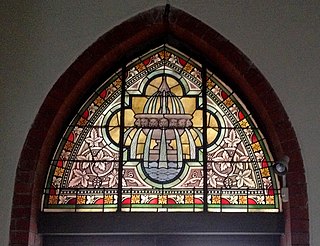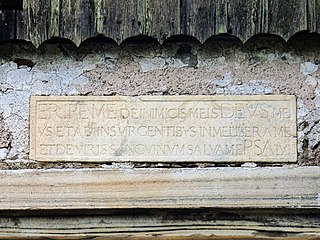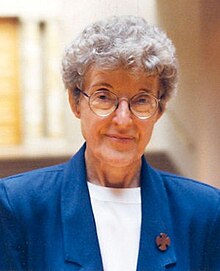
The Book of Psalms, also known as the Psalms, or the Psalter, is the first book of the third section of the Hebrew Bible called Ketuvim ("Writings"), and a book of the Old Testament.
Ani Ma'amin "I believe" is a prosaic rendition of Maimonides' thirteen-point version of the Jewish principles of faith. It is based on his Mishnah commentary to tractate Sanhedrin. The popular version of Ani Ma'amin is of a later date and has some significant differences with Maimonides' original version. It is of unknown authorship. Both Ani Ma'amin and a poetic version, Yigdal, form part of the prayers of Jews and have inspired varied settings to music.

Psalm 103 is the 103rd psalm of the Book of Psalms, beginning in English in the King James Version: "Bless the LORD, O my soul". The Book of Psalms is part of the third section of the Hebrew Bible, and a book of the Christian Old Testament. In Latin, it is known as "Benedic anima mea Domino". The psalm is a hymn psalm.

Based in San Jose, California, The Choral Project is a mixed-voice choir founded in 1996 by artistic director and conductor Daniel D. Hughes. The group's vision is "to heal our world through music and words," while their mission is "to connect to one another through choral theater, education and musical excellence."

Psalm 74 is the 74th psalm of the Book of Psalms, beginning in English in the King James Version: "O God, why hast thou cast us off for ever?". In the slightly different numbering system used in the Greek Septuagint and Latin Vulgate translations of the Bible, this psalm is Psalm 73. In Latin, it is known as "Ut quid Deus reppulisti in finem iratus". Subheaded a maschil or contemplation, and a community lament, it expresses the pleas of the Jewish community in the Babylonian captivity. It is attributed to Asaph.
Jewish music is the music and melodies of the Jewish people. There exist both traditions of religious music, as sung at the synagogue and domestic prayers, and of secular music, such as klezmer. While some elements of Jewish music may originate in biblical times, differences of rhythm and sound can be found among later Jewish communities that have been musically influenced by location. In the nineteenth century, religious reform led to composition of ecclesiastic music in the styles of classical music. At the same period, academics began to treat the topic in the light of ethnomusicology. Edward Seroussi has written, "What is known as 'Jewish music' today is thus the result of complex historical processes". A number of modern Jewish composers have been aware of and influenced by the different traditions of Jewish music.
This article describes the principal types of religious Jewish music from the days of the Temple to modern times.

Psalm 30 is the 30th psalm of the Book of Psalms, beginning in English in the King James Version: "I will extol thee, O LORD; for thou hast lifted me up". The Book of Psalms is part of the third section of the Hebrew Bible, and a book of the Christian Old Testament. In the slightly different numbering system used in the Greek Septuagint version of the Bible and in the Latin Vulgate, this psalm is Psalm 29. In Latin, it is known as "Exaltabo te Domine". It is a psalm of thanksgiving, traditionally ascribed to David upon the building of his own royal palace.

Psalm 92 is the 92nd psalm of the Book of Psalms, beginning in English in the King James Version: "It is a good thing to give thanks unto the LORD". In the slightly different numbering system used in the Greek Septuagint and Latin Vulgate translations of the Bible, this psalm is Psalm 91. In Latin, it is known as "Bonum est confiteri Domino ". The psalm is known as Mizmor Shir L'yom HaShabbat, is ostensibly dedicated to the Shabbat day.

Psalm 13 is the 13th psalm of the Book of Psalms, beginning in English in the King James Version (KJV): "How long, O Lord". The Book of Psalms is part of the third section of the Hebrew Bible, and a book of the Christian Old Testament. In the Greek Septuagint and the Latin Vulgate, this psalm is Psalm 12 in a slightly different numbering system. In Latin, it is known as "Usquequo Domine".

Psalm 36 is the 36th psalm of the Book of Psalms, beginning in English in the King James Version: "The transgression of the wicked saith within my heart". The Book of Psalms is part of the third section of the Hebrew Bible, and a book of the Christian Old Testament. In the slightly different numbering system used in the Greek Septuagint and Latin Vulgate translations of the Bible, this psalm is Psalm 35. In Latin, it is known as Dixit iniustus or Dixit injustus. The psalm is a hymn psalm, attributed to David.

Psalm 138 is the 138th psalm of the Book of Psalms, beginning in English in the King James Version: "I will praise thee with my whole heart". In Latin, it is known as "Confitebor tibi Domine in toto corde meo". The psalm is a hymn psalm.

Psalm 47 is the 47th psalm of the Book of Psalms, beginning in English in the King James Version: "O clap your hands". The Book of Psalms is the third section of the Hebrew Bible, and a book of the Christian Old Testament. In the slightly different numbering system used in the Greek Septuagint and Latin Vulgate translations of the Bible, this psalm is Psalm 46. In Latin, it is known as "Omnes gentes plaudite manibus". The psalm is a hymn psalm. It is one of twelve psalms attributed to the sons of Korah, and one of fifty-five psalms addressed to the "Chief Musician" or "Conductor".

Psalm 59 is the 59th psalm of the Book of Psalms, beginning in English in the King James Version: "Be merciful unto me, O God, be merciful unto me". In the slightly different numbering system of the Greek Septuagint version of the Bible and the Latin Vulgate, this psalm is Psalm 56. In Latin, it is known as "Eripe me de inimicis meis Deu". It is described as "a prayer composed when Saul sent messengers to wait at the house in order to kill him", and commentator Cyril Rodd describes it as a "vigorous plea for the destruction of the psalmist's enemies".
Psalm 86 is the 86th psalm of the Book of Psalms, beginning in English in the King James Version: "Bow down thine ear, O Lord, hear me: for I am poor and needy". In the slightly different numbering system used in the Greek Septuagint and Latin Vulgate translations of the Bible, this psalm is Psalm 85. In Latin, it is known as "Inclina Domine". It is attributed to David.

Mona Lyn Reese is an American composer, best known for her operas and choral music. Her work is melodic and accessible with an emphasis on driving or complex rhythms, movement, and contrasting textures. Her music communicates and expresses emotions traditionally or experimentally without allowing a prevailing fashion to dictate style, form, or harmony.

Choose Life, Uvacharta Bachayim is a studio album of the Choose Life, Uvacharta Bachayim dramatic oratorio by composer Mona Lyn Reese and librettist Delores Dufner OSB, released by the San José Chamber Orchestra and Chorus in 2011.

Delores Dufner is an American sacred music composer, librettist, and organist whose works have been included in Catholic hymnals in the United States, Canada, the United Kingdom and Australia. Dufner is a nun of the Order of Saint Benedict at Saint Benedict's Monastery in Saint Joseph, Minnesota. She is on the faculty of Saint Benedict's College and Saint John's University, Collegeville, Minnesota. In 1994, Dufner was commissioned to write the libretto for the oratorio Choose Life, Uvacharta Bachayim. "One of the best-known hymn writers in the church today. More than twenty different publishers have included her texts in their hymnals and hymn collections. In 2017 Dufner received the Christus Rex award from the Lutheran Valparaiso University.
Gerald Cohen is an American composer and cantor. He is currently the cantor at Shaarei Tikvah in Scarsdale, New York and is based in Yonkers. Cohen serves on the faculties of Jewish Theological Seminary and Hebrew Union College. Cohen's compositions are published by Oxford University Press, G. Schirmer/AMP, and Transcontinental Music Publications.
In Judaism, musical nusach refers the musical style or tradition of a community, particularly the chant used for recitative prayers such as the Amidah.















